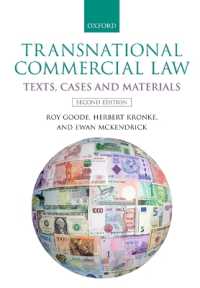Full Description
A history of Atlantic solidarity between Cuba and Africa, in struggle for African independence from colonial powers
The Cuban people hold a special place in the hearts of the people of Africa. The Cuban internationalists have made a contribution to African independence, freedom, and justice, unparalleled for its principled and selfless character.'
As Nelson Mandela states, Cuba was a key participant in the struggle for the independence of African countries during the Cold War and the definitive ousting of colonialism from the continent. Beyond the military interventions that played a decisive role in shaping African political history, there were many-sided engagements between the island and the continent. Cuba and Africa, 1959-1994 is the story of tens of thousands of individuals who crossed the Atlantic as doctors, scientists, soldiers, students and artists. Each chapter presents a case study - from Algeria to Angola, from Equatorial Guinea to South Africa - and shows how much of the encounter between Cuba and Africa took place in non-militaristic fields: humanitarian and medical, scientific and educational, cultural and artistic.
The historical experience and the legacies documented in this book speak to the major ideologies that shaped the colonial and postcolonial world, including internationalism, developmentalism and South-South cooperation.
Approaching African-Cuban relations from a multiplicity of angles, this collection will appeal to an equally wide range of readers, from scholars in black Atlantic studies to cultural theorists and general readers with an interest in contemporary African history.
Contents
Figures and Table
Foreword
Acknowledgements
Acronyms and Abbreviations
Timeline of Historical Events
Map of Africa, 1994
Introduction: Reconfiguring the Cuba-Africa Encounter
PART I: Politics and Solidarity
Chapter 1 Cubans in Algiers. The Political Uses of Memory
Chapter 2 Cuban policy and African Politics. Congo-Brazzaville and Angola, 1963-1977
Chapter 3 Motivations and Legacies of the Cuban Presence in Equatorial Guinea from 1969 to the Present
Chapter 4 Cuban internationalism in Africa. Civil Cooperation with Angola and its Aftermath
PART II: Trajectories
Chapter 5 The Experience of a Multidisciplinary Research into Angola's National Question: Anthropology in a War Context
Chapter 6 Cuban-Congolese Families: From the Fizi-Baraka underground to Havana
PART III: Voices
Chapter 7 Atlantic Voices: Imagination and Sound Dialogue between Congolese and Cuban singers in the 1950s
Chapter 8 Cultural Diplomacy in the Cold War: Musical Dialogues between Cuba and West Africa, 1960-1970
PART IV: Reconstructing History, Reconnecting Roots
Chapter 9 The Construction of a Spiritual Filiation from Havana to Ilé-Ifé
Chapter 10 The Island, the Peninsula, and the Continent: Cuban American Engagements with Africa li>
Contributors
Index






